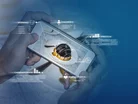Augmented reality has changed food & drinks manufacturing

The manufacturing businesses behind food and drinks packaging are always developing to the desires of the customer, to keep wrapping light-weight and comfortable, as well as eye-catching.
Now, augmented technology is changing the game for such manufacturers, who can make their packaging interactive and certainly memorable.
Sustainable possibilities with augmented reality and manufacturing
GenerationJuice, a manufacturer of juice dispensers, uses augmented reality to create new jobs and drive sales. The company makes app-driven drink dispensers which serve natural juice drinks into reusable bottles, instead of single use plastic bottles.
The company teamed-up with Made Smarter’s Adoption Programme to incorporate augmented reality in a digital demo experience, designed to let customers ‘see’ the dispenser at their workplace and enjoy drink samples at the same time.
GenerationJuice hopes that this will appeal to the sustainable ambitions of thirsty businesses, as the product can reduce waste. Research shows that the company can save the average customer one tonne of plastic or aluminium waste and reduce that company’s energy consumption by 63%.
Simon Edwards at GenerationJuice believes that augmented reality can be used within its manufacturing process to drive results.
"This new technology impacts our manufacturing in three ways:
“The AR allows potential customers to see our products electronically 'first hand' at their premises. It’s the shop window and this drives orders and moves us from small to medium manufacturing volume potential
“This volume drives economies of scale, and we can further automate our manufacturing and assembly processes
“As we grow in confidence and volume, we can recruit additional resources and investment for our manufacturing processes and the business generally. An example is that we are now entering frame contracts with component suppliers for specific volumes over 12-18 months which means improved delivery schedules, reduced management and resourcing admin, more efficient production routines and cost efficiencies."
Augmented reality can keep the hospitality industry safer
Besides food packaging, the hospitality sector is using this technology too. In a world where food can be delivered to your front door, restaurants need to do more to convince consumers to eat out - and here is where augmented reality steps in.
Boom Battle Bar, based across cities in the UK including Liverpool and Manchester, offers customers street food and cocktails, as well as augmented reality activities, including axe throwing and 'crazier' golf. Considering the pressure on the hospitality industry to maintain a high level of cleanliness post-COVID-19, having less objects to clean also makes restaurants safer.


